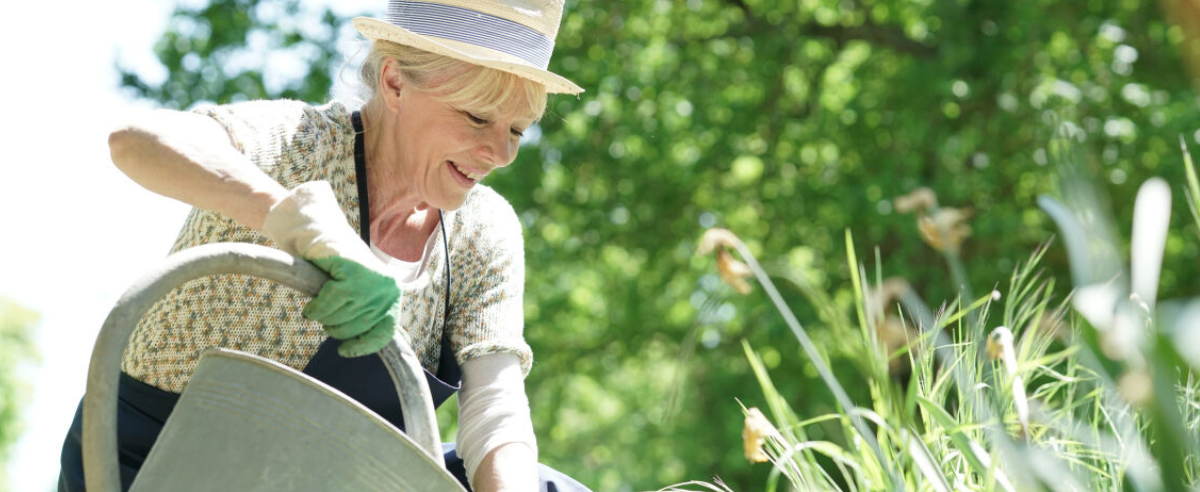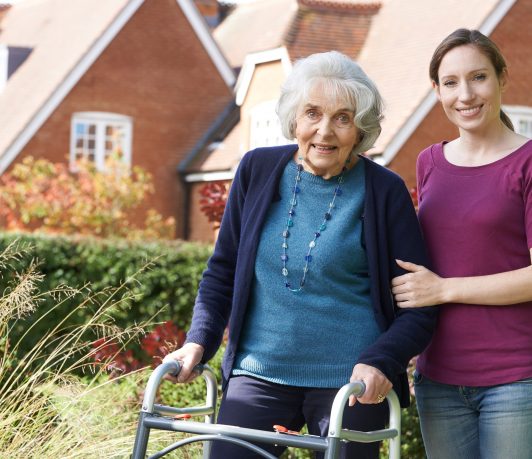The Health Benefits of Gardening for Older Australians
Aged Care, Health & Wellness, Home Care |

Spending time in the garden really is one of our country’s favourite hobbies and pastimes – and it’s easy to see why! In the midst of our fast-paced modern lives, gardening emerges as a practical solution for improving our wellbeing and, considering the tremendous benefits of gardening, it can especially be valuable for older Australians who are looking to get involved in something new.
But beyond just a fun hobby, gardening also offers tangible health benefits for our body and mind. In this blog, let’s delve into the science behind the benefits of gardening for older Australians, and provide some insights on its impact, including tips on how newbies can get started today.
The physical benefits
We all know how important it is to maintain our physical health, and it becomes increasingly important as we grow older. One of the great things about gardening is it offers a low-impact physical activity that even engages the entire body (through things like digging, planting or weeding). This type of exercise is gentle yet effective for all of us and can increase flexibility, build strength and enhance endurance – addressing some of the physical challenges often faced by older people.
The natural exposure to sunlight also facilitates our body’s production of vitamin D, which is important for our bone health and immune system. However, you or your loved one should also prioritise being sun-smart when gardening and follow all health advice (like wearing hats and sunglasses and using sunscreen). This is especially imperative when we contend with the Australian summer. Also, see our blog on staying safe during the warmer months.
Scientifically, gardening has also been linked with a reduction of chronic conditions, such as heart disease, diabetes, and obesity. The moderate physical activity involved in gardening contributes to regulating blood pressure and improving cardiovascular health, providing a natural defence against age-related ailments.
The emotional benefits
One of the reasons why gardening is so popular, particularly amongst older Australians, is because it has a positive effect on mental health. By its very nature, gardening is an immersive and sensory experience – and just by spending time in a garden can lead people to experience a positive emotional response. For example, some seniors who may be dealing with feelings of loneliness or isolation could find gardening provides them with a constructive pastime with a sense of purpose.
The therapeutic benefits of being amongst nature are well-documented; gardening provides a direct and personal connection to the natural world. The colours, textures, and fragrances of plants engage the senses, fostering a deep sense of appreciation and connection, which has even been shown to alleviate symptoms of depression and anxiety.
Watching your garden grow and develop over time also instils a sense of responsibility and accomplishment. These feelings trigger the release of feel-good neurotransmitters like serotonin and dopamine in the body, which not only enhances your mood but also contributes to stress reduction – both essential elements in maintaining cognitive health and wellbeing
Witnessing the tangible results of your efforts (as well as enjoying the blooming flowers or fruits and veggies ripe and ready for the kitchen table) can fill you with a sense and pride and purpose. And we know how important these feelings are for emotional wellbeing and positive ageing.
Additionally, the continuous learning involved in understanding the needs of different plants fosters problem-solving skills and strategic thinking. Numerous studies suggest a strong correlation between gardening and a reduced risk of developing dementia and cognitive impairments.
Getting started in the garden
Now that we’ve taken a look at all the health benefits on offer, let’s consider some ways to get started in the garden:
- Start small and keep things manageable. Why not begin with a few potted plants or a small garden bed? Then let your garden grow as your passion and confidence builds!
- Choose plants requiring a lower degree of maintenance. Check with your local nursery, research online, or speak with mates about some plant options that tend to require more minimal care.
- Make your garden suit you and your needs. You may want to consider raised garden beds or container gardening to limit the need for bending or kneeling. Think about what you or a loved one is comfortable doing, as well as what you or they prefer. You may also want to consider handrails to make your garden safer and more accessible.
- There is a variety of gardening tools available which have ergonomic designs tailor-made to assist older people in the garden. This includes designs that make activities more comfortable, with less stress placed on your hands and other joints.
- Think about the weather, the season, and plan gardening activities accordingly. For example, garden during the cooler parts of the day to avoid excessive heat, especially over summer. Once you get more comfortable in the garden, break down tasks into manageable segments to prevent fatigue.
Seasonal gardening tips
By understanding the seasons (and the plants that grow best across different periods of the year), you can go a long way to ensuring your garden is a success – and you can reap the rewards of blossoming flowers and delicious produce. Let’s take a quick look at each season and some of our favourite gardening tips for each:
- Spring is the perfect time to replenish your garden. The mild temperatures lend themselves to weeding and preparing the soil for the months ahead. In terms of veggies, Spring is ideal for tomatoes, zucchinis and beans; and for flowers, you may want to consider sowing seeds for marigolds and petunias.
- You should try and focus on watering and keeping plants safe and healthy during summer. Often people will use the warmer months to harvest their produce and enjoy their efforts from previous months. But for those keen to continue their gardening, heat-resistant herbs like basil and rosemary will thrive during summer.
- Autumn is a popular time to plant your favourite root vegetables, like carrots and potatoes. It’s also a great time to prune your plants and prepare them for the winter months ahead. You may also like to add some colour to your garden for an autumnal burst of colour – pansies are great for this!
- Many keen gardeners will turn to cold-resistant veggies such as kale or broccoli during winter. Otherwise, you may like to consider seeding in indoor pot plants and garden beds, so you can get an early start in for the upcoming spring!
In summary
Gardening is a fantastic way for older Australians to embrace a new pastime, continue an ongoing passion, and enhance their wellbeing and age positively. The health benefits of gardening are plentiful and include increased physical activity, cognitive stimulation, and emotional fulfilment and wellbeing.
So whether you’re interested in getting started at home, or you live in an aged care home and are contemplating joining your community’s gardening club, gardening can help guide you towards a healthier, happier, and more fulfilling life.
We’re here to support you
At Respect, we’re passionate about supporting older Australians to ensure the next phase of their lives are filled with purpose and possibilities. Whether it’s through our network or aged care homes or our home care support and services, we believe that creating a robust calendar of activities and social programs go hand in hand with providing our residents with engagement, creative outlets, and opportunities to improve their health and wellbeing – and this includes gardening.

Interested in learning more about our services?
Simply full in the below form and one of our friendly team will be in touch within 48 business hours.
Would you rather talk to us? Give us a call on 1300 144 144




